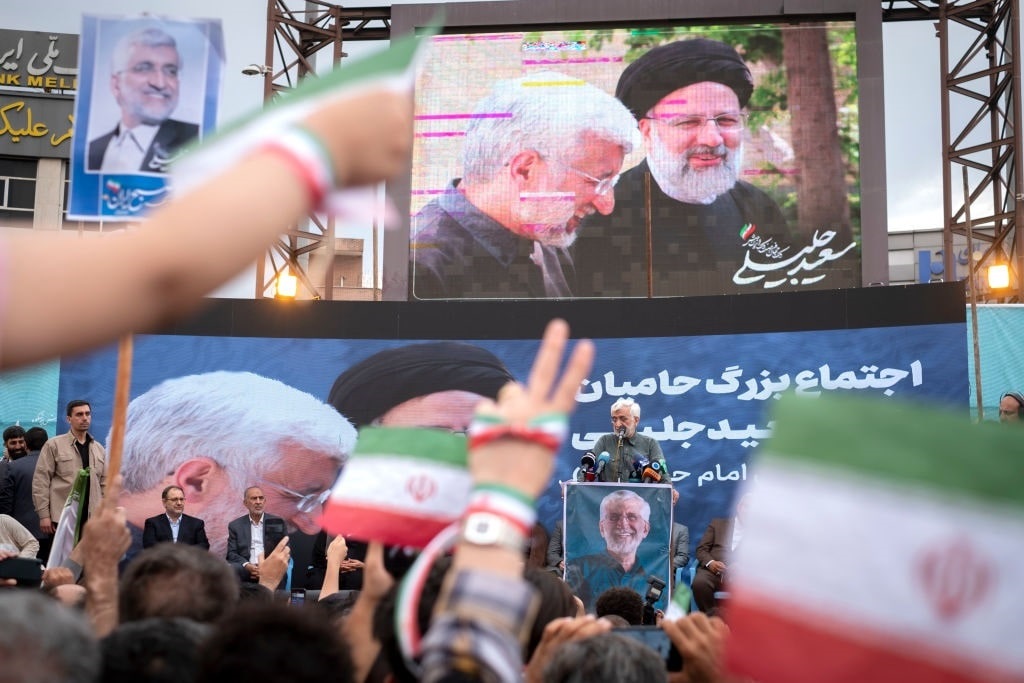It’s presidential election time in Iran. On Friday, June 28, the enthusiasm for the national election will be palpable in the theocracy, with citizens lining up early to cast their ballots – or not. It seems there’s a malaise manifest among Iranian voters, prompting the Supreme Leader Ayatollah Ali Khamenei to address the people and encourage them to vote. The voter turnout in the last parliamentary election was barely over 40%, the worst in the Iranian Republic’s existence.
Iran: New President, New Worldview?
For the good Persians, it seems the attitude is that one theocratic dictator is as bad as the next, and the United States will react to the next Iranian president just the same. Tehran’s power elite will prompt the same tiresome “death to America, death to Israel” chants at political gatherings, and Iran will still be the leading exporter of terror, befuddling the current White House resident with its proxies’ mischief-making around the Middle East. The Iranian mullahs will still sponsor the Houthis’ deadly attacks on shipping in the Red Sea.
Of the six presidential candidates vetted and approved to be on the ballot by Iran’s Guardian Council, five are reported to be hardliners. The sixth is the token reform candidate. Though the “hardliners” are rabidly anti-West, the reform candidate is only modestly so. As Reuters explained:
“Prominent among the hardliners are Mohammad Baqer Qalibaf, parliament speaker and former head of the powerful Revolutionary Guards, and Saeed Jalili, a former nuclear negotiator. The sole moderate candidate, Massoud Pezeshkian, has the endorsement of Iran’s politically-sidelined reformist camp that advocates detente with the West.”
Unfortunately for Pezeshkian, Khamenei is not among his fans. As one Iran-watcher observed, Khamenei’s vote is the only one that counts, and the Iranian people know that. To date, the supreme leader has been quiet regarding his preference. When the voting is complete, the Tehran leadership and the Iranian citizens will know who he chose.
Iran’s internal and geopolitical issues add complications to the election. A CNBC report observed:
“The election will take place against the backdrop of a battered Iranian economy, widespread popular discontent and crackdowns on dissent. The country is also dealing with high inflation, heavy Western sanctions, mounting tensions with the US, ramped-up Iranian nuclear enrichment, and the Israel-Hamas war.”
The common denominator in these issues is the influence of the United States in one form or another. President Joe Biden’s approach to Tehran’s leadership could be a significant game changer for a new Iranian president, but it won’t. The current administration’s fear of Iran hobbles it from being effective in reducing tensions by exhibiting strength and thereby modifying Tehran’s behavior regardless of who becomes the new president. Perversely, Iran has imposed its regional policies on America.
A Switch in Posture?
An exchange between reporters at a recent Pentagon press briefing is indicative of the problem. Though the subject was attacks on shipping in the Red Sea and Gulf of Aden by Houthi terrorist rebels supplied with Iranian weapons, what the Defense Department press secretary, Major General Patrick Ryder, said illustrates why the attacks will never let up and the United States cannot change Iran’s bellicose behavior.
 Ryder was asked if the Pentagon had any concerns about redeploying an aircraft carrier out of the region “as the Houthi attacks seem to continue.” He responded: “Well, we still have capability in the region. As you know, we have destroyers in both the CENTCOM [Central Command] and EUCOM [European Command] AORs [Areas of Responsibility] that have been very active in providing those kinds of defenses, as well as other capabilities to include aircraft and ISR capabilities.” The Pentagon “providing those kinds of defenses” explains the problem. The United States is on defense, and the Iran-supplied Houthi rebels are on offense. The US defense, obviously, has been ineffective in the face of 60 attacks that left four merchantmen dead and two vessels sunk with another seized.
Ryder was asked if the Pentagon had any concerns about redeploying an aircraft carrier out of the region “as the Houthi attacks seem to continue.” He responded: “Well, we still have capability in the region. As you know, we have destroyers in both the CENTCOM [Central Command] and EUCOM [European Command] AORs [Areas of Responsibility] that have been very active in providing those kinds of defenses, as well as other capabilities to include aircraft and ISR capabilities.” The Pentagon “providing those kinds of defenses” explains the problem. The United States is on defense, and the Iran-supplied Houthi rebels are on offense. The US defense, obviously, has been ineffective in the face of 60 attacks that left four merchantmen dead and two vessels sunk with another seized.
Should the Navy and Air Force assets stationed in the Gulf switch to an offensive posture? That would likely either limit or destroy the Houthis’ capability. Some would say then it wouldn’t matter who becomes president of Iran.
The views expressed are those of the author and not of any other affiliate.




